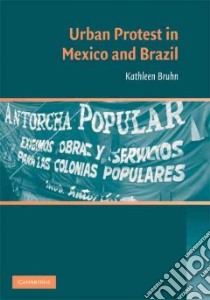Urban Protest in Mexico and Brazil - 9780521881296
Un libro in lingua di Kathleen Bruhn edito da Cambridge Univ Pr, 2008
- € 85.50
- Il prezzo è variabile in funzione del cambio della valuta d’origine
Why do social organizations decide to protest instead of working through institutional channels? This book draws hypotheses from three standard models of contentious political action - POS, resource mobilization, and identity - and subjects them to a series of qualitative and quantitative tests. The results have implications for social movement theory, studies of protest, and theories of public policy and agenda setting. The characteristics of movement organizations - type of resources, internal leadership competition, and identity - shape their inherent propensity to protest. Party alliance does not constrain protest, even when the party ally wins power. Instead, protest becomes a key part of organizational maintenance, producing constant incentives to protest that do not reflect changing external conditions. Nevertheless, organizations do respond to changes in the political context, governmental cycles in particular. In the first year of a new government, organizations have strong incentives to protest in order to establish their priority in the policy agenda.
Informazioni bibliografiche
- Titolo del Libro in lingua: Urban Protest in Mexico and Brazil
- Lingua: English
- Autore: Kathleen Bruhn
- Editore: Cambridge Univ Pr
- Collana: Cambridge Univ Pr (Hardcover)
- Data di Pubblicazione: 31 Marzo '08
- Genere: POLITICAL SCIENCE
- Argomenti : Protest movements Mexico Mexico City Case studies Protest movements Brazil SSao Paulo Case studies Municipal officials and employees Labor unions Political activity Latin America Cross-cultural studies
- Pagine: 212
- Dimensioni mm: 228 x 152 x 12
- ISBN-10: 0521881293
- EAN-13: 9780521881296


